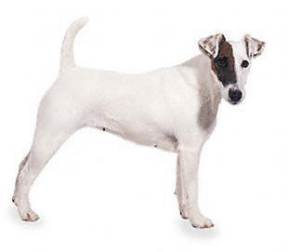Height: 14-15.5 inches
Weight: 15-19 lbs.
Life Span: 12-14 yrs.
Breed Group: Terriers
Overview
The popular fox terrier is lively and fun-loving, gets along with respectful
children over about five years old, and can live in the city or the country.
Other animals can be a problem. For instance, fox terriers may chase cats
that are not family members.
Obedience training and socialization must begin early. Fox terriers can
be distracted easily when excited by other animals or peripheral events,
so firm and consistent handling is required.
Without training, they may also develop some behavioral problems, such as
excessive barking, hole digging, or possessiveness with their toys or food
bowls. Aggressive games, such as tug-of-war, should not be played with these
dogs.
Appearance
The fox terrier has a flat, narrow head and a long muzzle that slopes to
a black nose.
There are two different coats, the smooth and the wirehaired. The smooth
coat is short and flat-lying. The wirehaired coat is moderately long and
has a dense, wiry texture; the hairs twist together, making it difficult
to part them in order to see the skin.
Fox terriers are white with black or black and tan markings. Wirehaired
puppies are black and white or all white at birth; the black on the face
and some of the markings on the shoulders, hips, and tail will turn tan.
Grooming & Exercise Needs
The wirehaired should be brushed and combed twice a week and clipped or
stripped (removing old hair by hand) to preserve the texture and luster
of the coat every three months. The smooth needs only a short brushing once
a week.
Fox terriers are extremely energetic and need daily exercise--long, vigorous
walks and/or ball playing--as well as human interaction.
Origins
The fox terrier, both the smooth and wirehaired, was developed in England
in the 18th century for "bolting," or driving out, foxes from their dens.
These fearless hunters would dig, crawl, and squirm their way into a fox
hole and attack unrelentingly until the fox bolted.
Breed-related health concerns: deafness, Legg-Perthes disease, mast
cell tumors.
Reference: AKC - American Kennel Club |

